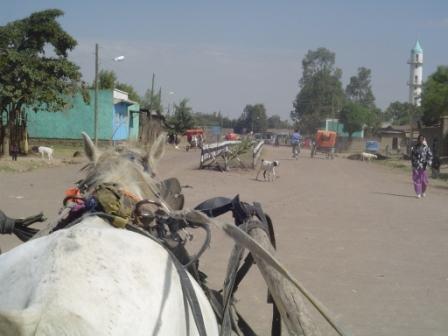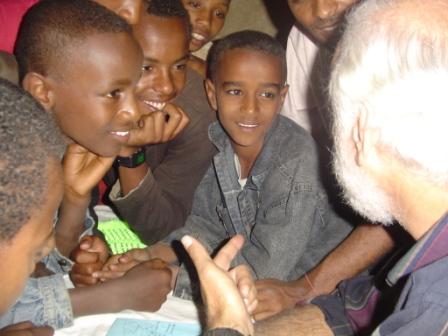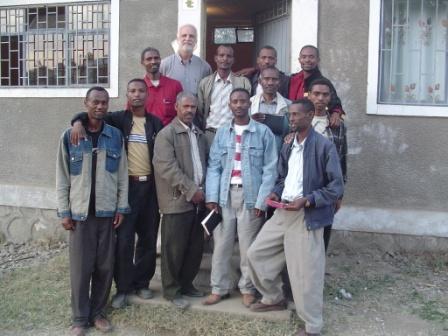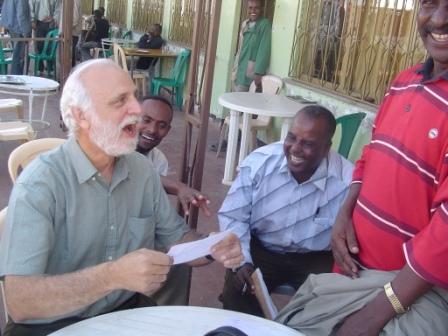|
restoring our biblical and constitutional foundations
|
What Government Cannot Do
I have spoken a great deal lately about the Burji church and about the work of the Lord in Burji. But in December we are also eager to return to Alaba, the land along the Bilatte River – “dusty Alaba,” filled with malaria, typhoid, and typhus, but filled even more with stalwart Jesus-followers whose “faith is active,” whose “love is working hard,” and whose “confidence in our Lord Jesus Christ is enduring” (1 Thess. 1:3). It is one of three areas in Ethiopia that the Lord Jesus has appointed Becky and me to work.

There is a profound tendency to want to help these people on the purely societal level in much the same way that a U.S. president is expected to accommodate the whims of 350 million Americans who demand affordable health care, job security, secure bank accounts, and optimal retirement plans. The missionary goes to Ethiopia with a sincere commitment to build Christ’s kingdom, but it is easy to read into Jesus’ words our own agenda: “My kingdom is not of this world, so act as though you can achieve peace, justice, equality, liberty, and a prosperous planet without Me or My Gospel.”
That’s certainly not what Jesus meant, but that’s how we act so often. If I am critical of Mr. Obama’s overly-optimistic view of government, it is not because I’m attacking him. Most Americans have bought into the lie that political, societal, and economic conditions can be solved by political instruments.
But as I point one finger elsewhere, I’m pointing three at myself. For how often do I act as if Jesus said, “Go, sell some of what you have”? Didn’t He say “all of what you have”? Didn’t He tell me to give to the poor? Didn’t He tell me to sacrifice so that others might live?
That’s why the Gospel is so offensive; that’s why it’s so intolerable. It expects us to act in a completely irrational way: Trust God! Put not your confidence in anything human! Renounce everything, and then you will possess everything! “We have nothing, although we possess everything,” wrote Paul, and he meant it (2 Cor. 6:10). “We’re beggars, although we make others rich.” “We’re dying but – as you can see – we go on living.”
I thus return to Alaba convinced as never before that the love of God in Jesus Christ is the only answer to what ails mankind. “Our message is not about ourselves,” wrote the apostle. “It’s about Jesus Christ as Lord. And we are your servants for His sake” (2 Cor. 4:5).

In Alaba my ministry will assume several shapes and forms, not least the privilege of teaching again in its small Bible school for 6 evenings and 2 full days. Below is a picture of my previous class in Alaba.

And what will I teach? Simply the Bible, for the Bible tells us of the only Messiah who can set men free and make them what they ought to be. I used to teach men’s writings and men’s well-thought-out methods. Naturally I am not saying that these things are evil. A dog shut up in a kennel is undoubtedly better off with a run of two yards than one of twelve inches. But that is not the quality of life Jesus promises His followers. Previously I led the class in a discussion of the book of 1 Thessalonians – a book if ever there was one that explodes the myth that Christians can expect an idyllic progression toward a politically organized paradise on earth. In Paul and his companions we find a perfect model for Christian sufferers.
And seldom have I seen a church suffer more than the Alaba church – murder, savage destruction of property, arson. Yet one also finds here a Wycliffe, a Huss, a Savonarola, a Menno Simons, fighting for the truth of the Gospel and the primacy of love. “We love and forgive our enemies,” said one believer to me, a man whose 8 year-old daughter had just been beheaded by the enemies of the cross. Government cannot make a man say that. Not even the church can do that. It takes a Christ-ian, a Christ-like man. I recall this example merely to point out that this is the caliber of people with whom we work and live in Alaba. This is a far cry from the utopian triumphalism and self-centeredness of post-election America.
And so I am delighted to be returning to Alaba. It is a place that is at once exasperating and bewitching. It is a place where I have developed deep and lasting friendships, and a place where I would like to make even more friends for the Gospel.

I am fervently praying that a great movement of God may break out there. But a work of God that results in men and women being transformed is never cheap. It comes at a price that many comfort-prone Americans won’t pay. It comes only when the church is sacrificial enough to be willing to suffer.
The bottom line of the bottom line: I do not look to the government. It is only when the church is the church and when she travails in labor pains that she brings forth sons and daughters who have the power to change society from the inside out.
November 10, 2008
David Alan Black is the editor of www.daveblackonline.com.